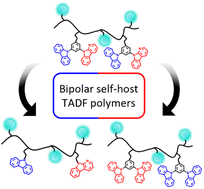A simplified approach to thermally activated delayed fluorescence (TADF) bipolar host polymers†
Abstract
Organic Light Emitting Diodes (OLEDs) are a critical part of current consumer electronics, from mobile device displays to solid-state lighting. Thus demand for the development of industrially compatible OLED materials continues to increase. Herein, we introduce a series of solution-processible polymers incorporating a Thermally Activated Delayed Fluorescence (TADF) emitter and a host species in the side chain to finely adjust the charge transport properties. For balanced charge transport, a bipolar host polymer based on carbazole and α-carboline was investigated in addition to the commonly employed unipolar host mCP and an electron transporting version thereof. We demonstrate that the combination of unipolar co-hosts on one polymer chain can generate, with less synthetic effort, the same optoelectronic properties as a polymer carrying the corresponding bipolar host molecule as a pendant.



 Please wait while we load your content...
Please wait while we load your content...